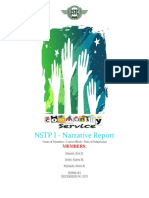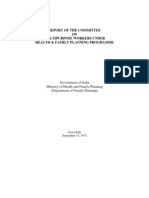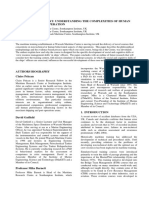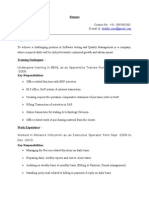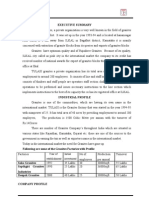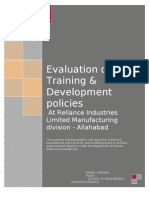Course Title Course Code Pre-requisite/Co-requisite
Course Title Course Code Pre-requisite/Co-requisite
Uploaded by
Ruthchell CiriacoCopyright:
Available Formats
Course Title Course Code Pre-requisite/Co-requisite
Course Title Course Code Pre-requisite/Co-requisite
Uploaded by
Ruthchell CiriacoOriginal Description:
Original Title
Copyright
Available Formats
Share this document
Did you find this document useful?
Is this content inappropriate?
Copyright:
Available Formats
Course Title Course Code Pre-requisite/Co-requisite
Course Title Course Code Pre-requisite/Co-requisite
Uploaded by
Ruthchell CiriacoCopyright:
Available Formats
NATIONAL SERVICE TRAINING PROGRAM-CIVIC WELFARE TRAINIGN SERVICE 2 MODULE 1
MODULE 1
Course Information
Course Title NSTP-CWTS 2
Course Code NSTP 2
Pre-requisite/Co- NSTP-CWTS 1
requisite
Course Description
The Civic welfare Training Service (CWTS) 2 is a sequel to CWTS 1. It is
designed to immerse students in activities that will arm them with the capability to
contribute in the upliftment of the general welfare and the quality of life of the
community and the enhancement of its facilities especially those that are devoted
to improving the health, environment, entrepreneurship, safety, recreation and
morale of the citizens.
Course Objectives/Outcomes
Upon passing the course, you must be able to:
1. Participate actively participate in team building activities;
2. Manifest effective leadership/fellowship skills;
3. Organize community assemblies and linkages;
4. Assist in the implementation of civic welfare projects;
5. Determine community problems and concerns and plan some viable intervention
measures;
6. Show a high level of interest in community-building task; and
7. Develop a harmonious working relationship with the community.
8. Appreciate the values of community immersion as a means of developing
themselves as trainees and helping other people improve their way of life through
the different dimensions of development done in the locality.
NATIONAL SERVICE TRAINING PROGRAM-CIVIC WELFARE TRAINIGN SERVICE 2 MODULE 1
Example Course Learning/Study Plan/Schedule
Week/Date Topic Teaching Learning Assessment
(Deadlines) and Learning Materials
Activities
Week 1 Orientation Lecture and Printed Quiz (Paper
discussion materials and Pencil) VLE
February 26
online (VLE) (USM Code,
Student
Handbook,
NSTP IRR)
Module 1 Lecture and Module Quiz (Paper
discussion and Pencil) VLE
(The Community
online (VLE)
Immersion
Required of
NSTP)
Week 2 Module 2 Lecture and Module Quiz (Paper
discussion and Pencil) VLE
March 5 (Understanding
online (VLE)
the Concept and
Principles of
Community
Immersion)
Module 3 Lecture and Module Quiz (Paper
discussion and Pencil) VLE
(The Process of online (VLE)
community
Immersion)
Week 3 Module 4 Lecture and Module Quiz (Paper
discussion and Pencil) VLE
March 12 (Management online (VLE)
of NSTP
Community-
based Project)
Week 4 Module 5 Lecture and Module Quiz (Paper
discussion and Pencil) VLE
March 19 (Documentation, online (VLE)
Monitoring, and
Evaluation of
NSTP
NATIONAL SERVICE TRAINING PROGRAM-CIVIC WELFARE TRAINIGN SERVICE 2 MODULE 1
Community-
Based Project)
Week 5 to Project Implementation
Week 8
March 26 to
April 16
Week 9 Midterm Exam
April 23
Week 10 to Project Implementation
Week 15
April 29-
June 4
Week 16 Evaluation of NSTP-CWTS
June 11
Week 17 First Aid Lecture and Module Quiz (Paper
discussion and Pencil) VLE
June 18 Earthquake Drill Video Clips
online (VLE)
and Fire Drill
Week 8 Final Exam
June 25
Course Requirements/Assessment and Evaluation Scheme/Grading System
(Insert Requirements and Grading System)
House Rules/Class Policies
(Insert rules and regulations in the class)
NATIONAL SERVICE TRAINING PROGRAM-CIVIC WELFARE TRAINIGN SERVICE 2 MODULE 1
MODULE 1
(The Community Immersion Requisite of NSTP)
Intended Learning Outcomes
By the end of this module, the student must be able to:
1. gain insights on community immersion as a requirement of NSTP;
2. explain the significance of the community immersion in the purview of NSTP and
national development; and
3. internalize the significance of community immersion as an effective tool in addressing
concerns of both NSTP trainees and the communities served.
Subtopic 1. Levelling off: Understanding The Essence of Community
Immersion in NSTP
Introduction:
One of the major features of the National Service Training Program (NSTP), particularly its
Civic welfare Training Service (CWTS) component, is the focused on the promotion of the
general welfare of the Filipinos via responsive and altruistic community-based projects by
student-trainees as they undergo community immersion in fulfilment of the requirements of
NSTP.
Suggested Course Syllabus for NSTP-CWTS
Suggested Course Syllabus for National Service Training Program
Civic Welfare Training Service 2
2nd Semester
i. Preliminary Information
Course Code: NSTP 2
Course Title/Descriptive Title Civic Welfare Training 2 (CWTS 2)
Community Immersion
Credit: 3 Units
Prerequisite: NSTP-CWTS 1
Course Code: Course Title
4
NATIONAL SERVICE TRAINING PROGRAM-CIVIC WELFARE TRAINIGN SERVICE 2 MODULE 1
II. Course Objectives
At the end of one semester, the student is expected to:
1. Participate activity in team building activities;
2. Manifest effective leadership/fellowship skills;
3. Organize community assemblies and linkages;
4. Assist in the implementation of civic welfare projects;
5. Determine community problems and concerns and plan some viable intervention
measures;
6. Show a high level of interest in community-building task; and
7. Develop a harmonious working relationship with the community.
8. Appreciate the values of community immersion as a means of developing
themselves as trainees and helping other people improve their way of life through
the different dimensions of development done in the locality.
III. Course Description
The Civic Welfare Training Service (CWTS) 2 is a sequel to CWTS 1. It is designed to
immerse students in activities that will arm them with the capability to contribute in the
upliftment of the general welfare and the quality of life of the community and the
enhancement of the facilities especially those that are devoted to improving the health,
environment, entrepreneurship, safety, recreation and morale of the citizens.
IV. Course Outline
A. Orientation 2 hrs
B. The Community Immersion Requisite of NSTP 3hrs
a. Leveling off: Understanding the essence of community immersion in NSTP
b. Syllabus for NSTP-CWTS
c. What is Community Immersion?
d. Objectives of NSTP Community Immersion
e. Activity No. 1 Concept of the Community Immersion a Requisite of the NSTP
C. Understanding the Concepts and principles of Community Service 5 hr
a. What is Community?
i. Elements of a Community
ii. Immersion as an Important Approach in Giving Community Service
Course Code: Course Title
5
NATIONAL SERVICE TRAINING PROGRAM-CIVIC WELFARE TRAINIGN SERVICE 2 MODULE 1
iii. What is Community Immersion?
iv. Philippine: The National Disaster Risk reduction and Management Plan
(NDRRMP) 2011-2018
v. Whom do you immense within the community?
vi. Conditions in a Community Immersion
vii. What person gains from community immersion?
viii. Do’s and Don’ts in Community Immersion
D. The Process of Community Immersion 5 hrs
a. Phase 1 : Pre-Immersion
b. Phase II: Entering the Community
c. Phase III: Community Integration
d. Phase IV: Community Needs assessment
e. Methods in Collecting Data for Community Needs assessment
E. Management of NSTP Community-Based Project 5 hrs
a. Project planning and Implementation
b. Project Planning
i. What is a Project Proposal?
ii. Project Planning
1. What is Project Proposal?
2. Purposes of Making Proposal in the Light of NSTP
3. The Parts of Project Proposal for NSTP Immersion Projects
4. Process Flow Charting Making Project Proposal for Community
Immersion
5. Towards a responsive Community action
F. Documentation, Monitoring, and Evaluation of STP Community-Based
Projects 5 .hr
a. Monitoring of NSTP Project
i. Significance of Monitoring NSTP Projects
ii. Tools Needed for Monitoring Purposes
b. Evaluation of NSTP Projects for Community Immersion
i. Importance of Evaluation
ii. What to Evaluate?
iii. Who will Conduct Evaluation of the NSTP Projects?
iv. How are the NSTP Project Evaluated?
v. When do we evaluate?
vi. How do we conduct Community Immersion Activities in the Light of
NSTP?
G. Project Implementation 54-60 hrs
Course Code: Course Title
6
NATIONAL SERVICE TRAINING PROGRAM-CIVIC WELFARE TRAINIGN SERVICE 2 MODULE 1
Suggested Projects/Activities along the Different Dimensions of Development Based on
the Felt Needs of the Community
a. Environmental Awareness
i. Supporting The Green Philippines Project as in Tree-growing Activities
ii. Advocacies on Various Environmental Concerns e.g. zero-waste
management, clean air, etc.
iii. Recycling session
iv. Wildlife Conservation and Protection Advocacy
b. Health-related Concern
i. Supplemental Feeding among pre-scholars
ii. Conduct of medical/Dental Mission
iii. Information Dissemination on Diseases SARS and AIDS
iv. Geriatric Care/ Assistance to Physically Challenged
v. Family Planning/reproductive Health
vi. Drug Abuse Prevention and Control
c. Literacy/Education
i. Seminar and Workshops
ii. Citizen Voter’s Education
iii. Peace education
iv. Conduct of Capability Training
v. Computer Tutorials
d. Entrepreneurship aspect
i. Conduct of skills/livelihood
Training like:
a. Candle Making
b. Cooking
c. Cosmetology
d. Hair Cutting
e. Food Processing
f. Seaweeds Farming
g. Handicrafts
h. Animal Husbandry
i. T-shirt Printing
j. Gardening
k. Non-food Processing
l. Novelty craft production
e. Safety Dimension
Course Code: Course Title
7
NATIONAL SERVICE TRAINING PROGRAM-CIVIC WELFARE TRAINIGN SERVICE 2 MODULE 1
i. Disaster relief services and other emergency services
f. Recreation and Wellness Program
i. Conduct of Sports/Dance Clinic
ii. Promotion of Indigenous Sports/Laro ng Lahi
iii. Organization of Sports/Dance Tournament and singing Competition
iv. Conduct of Indoor and Outdoor Activities
g. Morals of Citizenry
i. Values Formation and education
ii. Human Rights Promotion
iii. Conduct of Bible/fellowship
iv. Organization of Community-Based Ministries
v. Promotion of good Citizenship Values
h. Other Social Services
i. Organization of Peer Counselor’s Group
ii. NSRC/What One Has To Know about the Reservist?
iii. NSTP and Volunteerism
iv. Synthesis 3 hrs
1. The Role of BSTP in Fostering Productive and Responsible
Citizenship
v. Culminating Activity 6 hrs
H. Methodology
In order to properly observe the objectives of the training program, the following
method the objectives of the training program, the following method are employed.
1. Lecture/discussion/brainstorming sessions
2. Planning Workshop/ Team Building
3. Community Immersion/Practicum
4. Various Data-gathering Procedures
5. Group Sharing/ Meetings and Reporting
6. Application of Social Artistry Methodologies
I. Requirements
1 .Proof of Accomplishment/s
2. Project Plan
3. Pictorials
4. Documentary Reports
Course Code: Course Title
8
NATIONAL SERVICE TRAINING PROGRAM-CIVIC WELFARE TRAINIGN SERVICE 2 MODULE 1
5. Reflective Writing Requirements like the Preparation of Journal, Diary,
Impression, Reaction Papers, and the like
6. Satisfactory Attendance
7. Compliance with Established Policies and standard Operating Procedure
J. Basis for Evaluation
a. Attendance 20%
b. Project/Activity 20%
c. Portfolio/Narrative Report 60%
100%
K. Reference
1.Republic Act No. 9163 otherwise known as the National service training Program (NSTP) Act
of 2001
2. Implementing Rules and Regulations (IRR) of the National Training Programs (NSTP)
3. Labuguen et. al. Towards a Responsive Community Action (A Modular Worktext in NSTP 2
for Trainers and Students)
Formative Assessment 1 (Quiz, Exercise, Activity, etc.)
A. Quiz 1 (25 items selection) - Community Immersion as Requisite
of NSTP at the VLE
B. Activity 1- Collage Making
Using pictures cut and paste pictures/digtal to form a
collage presenting the concept of community
immersion as requisite of National Service Training
Program (NSTP)
Chapter/Module 1 References
The 1987 Philippine Constitution
Labuguen et.al (2019) NSTP 2 Understanding the National Service Training Program,
Mutya Publishing House, INC.
Labuguen et al, (2008) Towards a Responsive Community Action ( A Modular Worktext
in NSRP 2 for Trainers and Students), Mutya Publishing House, INC.
EDSA People Power Commission with CHED
Course Code: Course Title
9
You might also like
- Esc50 Qla 24cfe0fdDocument15 pagesEsc50 Qla 24cfe0fdStefan-Serban MuscaliucNo ratings yet
- Lesson 1 Foundation LogicDocument26 pagesLesson 1 Foundation LogicAsh LeyNo ratings yet
- Statement of The Philippine Hierarchy On The Novels of Dr. Jose RizalDocument18 pagesStatement of The Philippine Hierarchy On The Novels of Dr. Jose RizalKiara AquinoNo ratings yet
- Chapter 5 Consumption and SavingsDocument3 pagesChapter 5 Consumption and SavingsAngelica Valdez Bauto100% (1)
- Lesson 11 Appropriaciation in ArtDocument19 pagesLesson 11 Appropriaciation in ArtHachi Mae LubaNo ratings yet
- Lesson 19 20Document14 pagesLesson 19 20G spotNo ratings yet
- Prof. Ed QuestionDocument5 pagesProf. Ed QuestionkennethNo ratings yet
- Cradles of Early ScienceDocument2 pagesCradles of Early ScienceKristian CualesNo ratings yet
- Decree Regulating PoloDocument2 pagesDecree Regulating PoloMicsjadeCastilloNo ratings yet
- NSTP I - Narrative Report: MembersDocument24 pagesNSTP I - Narrative Report: MembersKikoTVNo ratings yet
- Activity 2 BSE 3-1E Mr. Erick Mercado: Then and NowDocument2 pagesActivity 2 BSE 3-1E Mr. Erick Mercado: Then and NowJoshua LagonoyNo ratings yet
- Part 5 Module Art Appreciation GEd 108Document50 pagesPart 5 Module Art Appreciation GEd 108Ara ManaloNo ratings yet
- PROF. ED 4 Syllabus Aligned With Ppst...Document7 pagesPROF. ED 4 Syllabus Aligned With Ppst...nhikie del socorroNo ratings yet
- Gec Art ManualDocument14 pagesGec Art ManualEarl MontecastroNo ratings yet
- Coastal Clean Up 2017Document4 pagesCoastal Clean Up 2017Jenel Apostol AlbinoNo ratings yet
- Module in Purposive Communication 3Document16 pagesModule in Purposive Communication 3Karyl Peñaflor - GurayNo ratings yet
- Analysis of Two Navels (Post Colonial Criticism)Document30 pagesAnalysis of Two Navels (Post Colonial Criticism)Kate Ciara SalabsabinNo ratings yet
- Lesson 1 Communication ProcessesDocument14 pagesLesson 1 Communication ProcessesJhon Dave SurbanoNo ratings yet
- To Celia: Drink To Me Only With Thine Eyes and I Will Pledge With MineDocument5 pagesTo Celia: Drink To Me Only With Thine Eyes and I Will Pledge With MineSouna YaghiNo ratings yet
- Digital and Conventional Learning ResourcesDocument9 pagesDigital and Conventional Learning Resourcespy6zqkqwjdNo ratings yet
- CRabDocument7 pagesCRabAldrin NacionNo ratings yet
- The Nature and Role of Technical WritingDocument11 pagesThe Nature and Role of Technical WritingMar SebastianNo ratings yet
- Virtue Ethics: Three Kinds of Ethical TheoriesDocument7 pagesVirtue Ethics: Three Kinds of Ethical TheoriesLpc Aimee RoqueNo ratings yet
- Midterm - Enrile Jay Mark M.Document3 pagesMidterm - Enrile Jay Mark M.Jay Mark EnrileNo ratings yet
- Adobo - and CMDocument23 pagesAdobo - and CMliyam jamesNo ratings yet
- Definition of Community - Guidelines and Procedures of Community ImmersionDocument2 pagesDefinition of Community - Guidelines and Procedures of Community ImmersionSoojoo Hong100% (1)
- Project Proposal 2 OPLAN Youth Education Grp2Document6 pagesProject Proposal 2 OPLAN Youth Education Grp2Maverick Pete100% (1)
- Venn DiagramDocument19 pagesVenn Diagramrica villanueva0% (1)
- Organizational Culture of SchoolsDocument5 pagesOrganizational Culture of SchoolsJohnmar TacugueNo ratings yet
- Lesson 12. Flipped ClassroomDocument13 pagesLesson 12. Flipped ClassroomKim ArdaisNo ratings yet
- Module 6 (AoL2)Document6 pagesModule 6 (AoL2)Cristobal CantorNo ratings yet
- Scientific and Technological Capabilities and Economic Catch-UpDocument23 pagesScientific and Technological Capabilities and Economic Catch-UpPolyjuice PotionNo ratings yet
- Leron Leron SintaDocument8 pagesLeron Leron SintaJoyce Ann EspanolaNo ratings yet
- EthicsDocument13 pagesEthicsVinnese Rile Balataria SecuyaNo ratings yet
- Erotic Symbols in The Poems of Peter Solis NeryDocument14 pagesErotic Symbols in The Poems of Peter Solis NeryGester JaictenNo ratings yet
- STS Module 2Document23 pagesSTS Module 2Nicho LozanoNo ratings yet
- When I Was No Bigger Than A Huge by Jose Garcia VillaDocument4 pagesWhen I Was No Bigger Than A Huge by Jose Garcia Villagandaku2No ratings yet
- Lesson Plan Template 1Document7 pagesLesson Plan Template 1Cyrylle Doyayag MagloyuanNo ratings yet
- Foundations of Philippine Education: Task No. 2Document4 pagesFoundations of Philippine Education: Task No. 2Karen Nicole Borreo MaddelaNo ratings yet
- Copy of The Persona in Philippine Folk Literature20200916 - 14193514Document14 pagesCopy of The Persona in Philippine Folk Literature20200916 - 14193514Helena Kristina CosNo ratings yet
- Rizal Family Childhood EducationDocument27 pagesRizal Family Childhood EducationPb CunananNo ratings yet
- LiteratureDocument2 pagesLiteratureAizel TalladaNo ratings yet
- Guidelines To Materials DevelopmentDocument22 pagesGuidelines To Materials DevelopmentMayom MabuongNo ratings yet
- EPortfolioDocument25 pagesEPortfolioElrine Franz VergaraNo ratings yet
- Indegenous PeopleDocument2 pagesIndegenous PeopleEloisa Banisal50% (2)
- Osmeña Family: By: NatashaDocument12 pagesOsmeña Family: By: NatashaNatasha SyNo ratings yet
- Module in PED 112 Chapter 1 5Document27 pagesModule in PED 112 Chapter 1 5Lene OfallaNo ratings yet
- Module 3 For Merge Answer SthanDocument15 pagesModule 3 For Merge Answer SthanJoshuaNo ratings yet
- Unit 4. 21st Century Skill CategoriesDocument40 pagesUnit 4. 21st Century Skill CategoriesGlay Vhincent SumayloNo ratings yet
- Learning Material For Week 7 and Week 8Document14 pagesLearning Material For Week 7 and Week 8Vieyah Angela VicenteNo ratings yet
- Foundation of Curriculum ReportDocument20 pagesFoundation of Curriculum ReportEdlynNacionalNo ratings yet
- Art Education and AppreciationDocument122 pagesArt Education and AppreciationKarlyn RamosNo ratings yet
- ProfEd108 - 04 - Chap2 - Module 2 - Safety Issues On The Use of ICT Including E-Safety RulesDocument3 pagesProfEd108 - 04 - Chap2 - Module 2 - Safety Issues On The Use of ICT Including E-Safety RulesJohaida71 EscarlanNo ratings yet
- Disaster Preparedness Community ProfilingDocument17 pagesDisaster Preparedness Community ProfilingGrachelle RamirezNo ratings yet
- The 21st Century Curricular Landscape in The ClassroomsDocument33 pagesThe 21st Century Curricular Landscape in The ClassroomsMelody SaulonNo ratings yet
- Wmsu Obe Syllabus SampleDocument11 pagesWmsu Obe Syllabus SampleRhiena MacarayaNo ratings yet
- Gawain 2Document3 pagesGawain 2cortez vincentNo ratings yet
- Cedrix James Estoquia - OLLC Lesson 4.6 Presentation and Interpretation of Data ApplicationDocument4 pagesCedrix James Estoquia - OLLC Lesson 4.6 Presentation and Interpretation of Data ApplicationDeuK WRNo ratings yet
- A Brief History of Badminton from 1870 to 1949From EverandA Brief History of Badminton from 1870 to 1949Rating: 3.5 out of 5 stars3.5/5 (2)
- Chapter 8Document5 pagesChapter 8Ruthchell CiriacoNo ratings yet
- Chapter 9Document12 pagesChapter 9Ruthchell CiriacoNo ratings yet
- Chapter 5Document5 pagesChapter 5Ruthchell CiriacoNo ratings yet
- Chapter 7Document5 pagesChapter 7Ruthchell CiriacoNo ratings yet
- The Industry, The Company and Its Products 1.1 The IndustryDocument59 pagesThe Industry, The Company and Its Products 1.1 The IndustryRuthchell CiriacoNo ratings yet
- Chapter 6Document4 pagesChapter 6Ruthchell CiriacoNo ratings yet
- Chapter 10Document4 pagesChapter 10Ruthchell CiriacoNo ratings yet
- Complete FsDocument69 pagesComplete FsRuthchell CiriacoNo ratings yet
- Chapter 1IDocument6 pagesChapter 1IRuthchell CiriacoNo ratings yet
- Complete FinalDocument53 pagesComplete FinalRuthchell CiriacoNo ratings yet
- Chapter IxDocument1 pageChapter IxRuthchell CiriacoNo ratings yet
- Badminton Officials, Duties and Responsibilities. Fundamentals and Basic SkillsDocument6 pagesBadminton Officials, Duties and Responsibilities. Fundamentals and Basic SkillsRuthchell CiriacoNo ratings yet
- 2 - Chapter I - Lesson 2 - Imagery in PoetryDocument9 pages2 - Chapter I - Lesson 2 - Imagery in PoetryRuthchell CiriacoNo ratings yet
- The Industry, The Company and Its Products 1.1 The IndustryDocument7 pagesThe Industry, The Company and Its Products 1.1 The IndustryRuthchell CiriacoNo ratings yet
- Chapter 4Document3 pagesChapter 4Ruthchell CiriacoNo ratings yet
- Chapter 2Document5 pagesChapter 2Ruthchell CiriacoNo ratings yet
- Chapter 1maliDocument8 pagesChapter 1maliRuthchell CiriacoNo ratings yet
- What Is It About The Philippines That Makes It Different From The Rest of The WorldDocument1 pageWhat Is It About The Philippines That Makes It Different From The Rest of The WorldRuthchell CiriacoNo ratings yet
- 2 - Chapter I - Lesson 1 - Denotation and Connotation in PoetryDocument9 pages2 - Chapter I - Lesson 1 - Denotation and Connotation in PoetryRuthchell CiriacoNo ratings yet
- Ia Vol 1 Valix 2019 Answer Key 1pdf 3 PDF FreeDocument231 pagesIa Vol 1 Valix 2019 Answer Key 1pdf 3 PDF FreeRuthchell CiriacoNo ratings yet
- Foldermania SlidesManiaDocument10 pagesFoldermania SlidesManiaRuthchell CiriacoNo ratings yet
- 2 - Chapter I - Lesson 2 - Imagery in PoetryDocument9 pages2 - Chapter I - Lesson 2 - Imagery in PoetryRuthchell CiriacoNo ratings yet
- Week 1Document2 pagesWeek 1Ruthchell CiriacoNo ratings yet
- Interval and Change of EndsDocument4 pagesInterval and Change of EndsRuthchell CiriacoNo ratings yet
- Literature of GreeceDocument11 pagesLiterature of GreeceRuthchell CiriacoNo ratings yet
- Shape of The Water AnalysisDocument2 pagesShape of The Water AnalysisRuthchell CiriacoNo ratings yet
- What Is It About The Philippines That Makes It Different From The Rest of The WorldDocument1 pageWhat Is It About The Philippines That Makes It Different From The Rest of The WorldRuthchell CiriacoNo ratings yet
- PlumberDocument2 pagesPlumberEmad BassemNo ratings yet
- SD 01 Ipc Scheme General Requirements Rev 3Document32 pagesSD 01 Ipc Scheme General Requirements Rev 3GaneshNo ratings yet
- Iace Career Development ProgramDocument13 pagesIace Career Development ProgramiacetechnogiesNo ratings yet
- BANJOLINODocument67 pagesBANJOLINORogie Del Depaz RegalaNo ratings yet
- SB 2581 CPD Act of 2015Document11 pagesSB 2581 CPD Act of 2015Alvin Cloyd Dakis, MHSS, RN, CGDPNo ratings yet
- FSGDocument17 pagesFSGEdward Roy “Ying” AyingNo ratings yet
- Prediction of Law Enforcement Training Performance and Dysfunctional Job Performance With General Mental Ability, Personality, and Life History VariablesDocument24 pagesPrediction of Law Enforcement Training Performance and Dysfunctional Job Performance With General Mental Ability, Personality, and Life History VariablesAnonymous G6W68qC3No ratings yet
- Why Skill Development Training Is ImportantDocument3 pagesWhy Skill Development Training Is Importantmadhu valivarthyNo ratings yet
- Internship BriefDocument4 pagesInternship Briefmd_abdulkarim34No ratings yet
- 10 Case Study On Conflict Management 1Document3 pages10 Case Study On Conflict Management 1aditya saiNo ratings yet
- Risk AssesmentDocument23 pagesRisk AssesmentMohamed ReezaNo ratings yet
- Application Build For Administrators: ClassroomDocument2 pagesApplication Build For Administrators: ClassroomSnehasis BasuNo ratings yet
- Socializing, Orienting, and Developing Employees - PPTX Chp8Document13 pagesSocializing, Orienting, and Developing Employees - PPTX Chp8Sana BudhwaniNo ratings yet
- Kartar Singh Committee Report 1973Document81 pagesKartar Singh Committee Report 1973lalit82318733% (3)
- Offshore Emergency Response Team Member Valid From 1st of March 2017Document48 pagesOffshore Emergency Response Team Member Valid From 1st of March 2017Ganesh GanyNo ratings yet
- Review of Compliance: Green Light PBS Limited September LodgeDocument31 pagesReview of Compliance: Green Light PBS Limited September Lodgeapi-155487134No ratings yet
- Train The Trainer Course - Course OutlineDocument3 pagesTrain The Trainer Course - Course OutlineSupport ALProgramsNo ratings yet
- This Study Resource Was: Training and Developing EmployeesDocument9 pagesThis Study Resource Was: Training and Developing EmployeesNouman AhmadNo ratings yet
- Training Develpmnt in DaspallaDocument94 pagesTraining Develpmnt in DaspallaNitika Jain100% (1)
- Content and Context: Understanding The Complexities of Human Behaviour in Ship OperationDocument11 pagesContent and Context: Understanding The Complexities of Human Behaviour in Ship OperationBirender TamsoyNo ratings yet
- Sona Resume Nov'11 - 2Document4 pagesSona Resume Nov'11 - 2Michael AntoNo ratings yet
- Employee Satisfaction at Tulasi Granites Mba Project ReportDocument83 pagesEmployee Satisfaction at Tulasi Granites Mba Project ReportBabasab Patil (Karrisatte)100% (1)
- Ryan Lyn: For The Attention of The Recruiting PanelDocument1 pageRyan Lyn: For The Attention of The Recruiting PanelMaesie IgubanNo ratings yet
- Careertanks - HSE ManagerDocument6 pagesCareertanks - HSE ManagerBleep NewsNo ratings yet
- Training and Developing Employees: Global Edition 12eDocument41 pagesTraining and Developing Employees: Global Edition 12eĐàm Quang Thanh TúNo ratings yet
- Project Done at FactDocument120 pagesProject Done at Factdevika20No ratings yet
- Training and Development Project of Ril AllahabadDocument80 pagesTraining and Development Project of Ril Allahabaddeepalidwivedi75% (4)
- Quality Manual - Simba Fashions Ltd.Document143 pagesQuality Manual - Simba Fashions Ltd.ABDULNo ratings yet
- School Profile For TMDocument26 pagesSchool Profile For TMcatherinecottrell82No ratings yet









